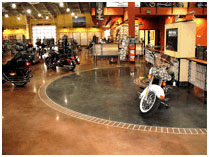Polished concrete surfaces and floors are becoming a trend among commercial buildings, restaurants, clothing stores, and other businesses. Although polished concrete floors do provide traction, if not polished properly it may not provide enough. This makes customers and employees prone to dangerous slips and falls. If the resulting injuries are bad enough, the business may be facing a lawsuit. With the headway made over the past few years in polished concrete, surface contractors have learned the perfect solution—the coefficient of friction (COF).
Customers expect to remain on their feet when walking into a store or business building. Polished floors need to have a certain level of COF to prove that they provide a safe level of traction. As consumers, you are most likely not familiar with this terminology. This article is here to help shed light on the subject.
The coefficient of friction is the slip resistance of a hard surface when it is both wet and dry. These coefficients vary according to the type of flooring. For instance, hard tiles require a different coefficient than hardwood floors. Polished concrete is the newest of the flooring options, so required COF values have only just recently been established.
The ANSI B101.1 Test Method measures the wet static coefficient of friction of a hard surface. Any concrete polishing contractor should be familiar with this method. The method is very reliable and highly credible.
BOT 3000 is a popular device that is now being used in the industry to test the various factors of slip resistance. This includes static coefficient of friction and dynamic coefficient of friction. It is capable of testing floors under wet conditions due to its non-slip front wheel drive tires. Contractors can save information on this device and print out results or transfer them directly to the computer. If need be, contractors can hire testing firms to perform this test for them.
To help maintain polished floors slip resistance, keep it dry, especially if it is indoors. Spot cleaning with mops, cloths, or disposable rags on spills or water is safer than cleaning the entire floor at once. Contractors need to incorporate or recommend suitable drainage and matting to absorb some of this water when necessary. This will help keep the floors dry.
Safety should be the number one priority of any business. Customers are what ultimately keep them afloat financially. Lawsuits not only hurt customers, but they can destroy the company’s reputation. With the dominance of cell phones and Internet, word travels quickly and information is available at all times. Polished concrete floors must adhere to the required level of the coefficient of friction. This will keep customers and businesses free from harm.
Considering polished concrete floors in your commercial building? If you are in North Carolina, call Preferred Concrete Polishing at (336) 992-5600. We are located in Kernersville and are happy to accommodate you in any way. We have more than 20 years of experience in the flooring industry.






Comments are closed.